- Home
- Jojo Moyes
Honeymoon in Paris: A Novella Page 2
Honeymoon in Paris: A Novella Read online
Page 2
‘A pleasure to meet you, Mademoiselle,’ I said. I held out my hand, and used the formal vous to convey my respects. Her fingers were so ridiculously soft that I had to check I was actually holding them.
‘Laure has modelled for me on many occasions. You remember the painting with the woman on the blue chair? The one you’re particularly fond of? That was Laure. She’s an excellent model.’
‘You’re too kind, Monsieur,’ she said.
I smiled warmly. ‘I do know the painting. It’s a beautiful image.’
The woman’s eyebrow lifted just a fraction. I realized afterwards that it was unlikely she was often complimented by another woman. ‘I always think it an oddly regal work.’
‘Regal. Sophie is quite right. That is exactly how you appear in it,’ Édouard said.
Laure’s gaze flickered between us, as if she was trying to work out whether I was mocking her.
‘The first time my husband painted me I looked like the most awful old maid,’ I said quickly, wanting to put her at ease. ‘So severe and forbidding. I think Édouard said I looked like a stick.’
‘I’d never say such a thing.’
‘But you thought it.’
‘It was a terrible painting,’ Édouard agreed. ‘But the fault was entirely mine.’ He looked at me. ‘And now I find it impossible to paint a bad picture of you.’
It was still hard not to meet his gaze without blushing a little. There was a brief silence. And I looked away.
‘My congratulations on your wedding, Madame Lefèvre. You are a very lucky woman. But, perhaps, not as lucky as your husband.’
She nodded to me, and then to Édouard, as she lifted her skirts slightly from the wet pavement and walked away.
‘Don’t look at me like that in public,’ I scolded him, as we watched her go.
‘I like it,’ he said, lighting a cigarette and looking ridiculously pleased with himself. ‘You go such an endearing colour.’
Édouard saw a man he wanted to speak to over in the tabac, so I let him go, walked into the Bar Tripoli and stood at the counter for a few minutes, watching Monsieur Dinan at his usual spot in the corner. I asked for a glass of water, and drank it, exchanging a few words with the barman. Then I walked over and greeted Monsieur Dinan, removing my hat.
It took him a few seconds to register who I was. I suspected it was only my hair that gave me away. ‘Ah. Mademoiselle. And how are you? It’s a chill evening, is it not? Is Édouard well?’
‘He is perfectly fine, Monsieur, thank you. But I wonder if I might have two minutes to discuss a private matter.’
He glanced around the table. The woman to his right gave him a hard look. The man opposite was too busy talking to his companion to notice. ‘I do not believe I have any private matters to discuss with you Mademoiselle.’ He looked at his female companion as he spoke.
‘As you wish, Monsieur. Then we shall discuss it here. It is a simple matter of payment for a painting. Édouard sold you a particularly fine work in oil pastels – The Market at Grenouille – for which you promised him …’ I checked my paper ‘… five francs? He would be much obliged if you could settle the sum now.’
The convivial expression disappeared. ‘You are his debt collector?’
‘I believe that description is a little strong, Monsieur. I am merely tidying Édouard’s finances. And this particular bill is, I believe, some seven months old now.’
‘I am not going to discuss financial matters in front of my friends.’ He turned away from me in high dudgeon.
But I had half expected this. ‘Then I’m afraid, Monsieur, that I will be forced to stand here until you are ready to discuss it.’
All pairs of eyes around the little table had now landed on me, but I did not so much as colour. It was hard to embarrass me. I had grown up in a bar in St Peronne; I had helped my father throw out drunks from the age of twelve, had cleaned the gentlemen’s WC, had heard talk so bawdy it would have made a street girl blush. Monsieur Dinan’s theatrical disapproval held no terrors for me.
‘Well, you will be there all evening, then. For I do not have such a sum on me.’
‘Forgive me, Monsieur, but I was standing at the bar for some time before I came over. And I could not help but notice that your wallet was most generously stocked.’
At this his male companion began to laugh. ‘I think she has the measure of you, Dinan.’
This seemed only to enrage him.
‘Who are you? Who are you to embarrass me so? This is not Édouard’s doing. He understands the nature of a gentleman’s friendship. He would not come here so gauchely, demanding money and embarrassing a man in front of his friends.’ He squinted at me. ‘Hah! I remember now … You are the shop girl. Édouard’s little shop girl from La Femme Marché. How could you possibly understand the ways of Édouard’s circle? You are …’ he sneered ‘… provincial.’
He had known that would hurt. I felt the colour rising slowly from my chest. ‘I am indeed, Monsieur, if it is now a provincial concern to eat. And even a shop girl can see when Édouard’s friends have taken advantage of his generous nature.’
‘I’ve told him I will pay him.’
‘Seven months ago. You told him you would pay him seven months ago.’
‘Why should I answer to you? Since when did you become Édouard’s chienne méchante?’ He actually spat the words at me.
Briefly, I froze. And then I heard Édouard’s voice, behind me, reverberating from somewhere deep within his chest. ‘What did you call my wife?’
‘Your wife?’
I turned. I had never seen my husband’s expression so dark. ‘Are you deaf as well as charmless now, Dinan?’
‘You married her? That sour-faced shop girl?’
Édouard’s fist shot out so fast that I barely saw it. It came from somewhere behind my right ear and caught Dinan so hard on the chin that he actually lifted a little into the air as he flew backwards. He crashed down in a pile of chairs, the table overturning as his legs swung over his head. His female companions shrieked as the wine bottle broke, spraying Medoc over their clothes.
The bar fell quiet, the fiddler stopping mid-note. The air felt electrified. Dinan blinked, struggling to right himself.
‘Apologize to my wife. She is worth a dozen of you.’ Édouard’s voice was a growl.
Dinan spat something, possibly a tooth. He lifted his chin, a thin scarlet trickle bisecting it, and muttered, so quietly that I thought only I could have heard him: ‘Putain.’
With a roar, Édouard went for him. Dinan’s friend launched himself on Édouard, throwing punches at his shoulders, his head, his broad back. They bounced off my husband as if they were gnats. I could just make out Édouard’s voice: ‘How dare you insult my wife?’
‘Fréjus, you blackguard!’ I turned to see Michel Le Duc landing a punch on someone else.
‘Arrêtez, Messieurs! Arrêtez vous!’
The bar erupted. Édouard pushed himself upright. He shook Dinan’s friend from his shoulders, as if he were shrugging off a coat, and swung a chair behind him. I felt, as much as heard, the wood crack on the man’s back. Bottles skimmed the air over our heads. Women shrieked, men swore, customers scrambled for the doors, while street boys ran in through them to join the mêlée. In the chaos, I saw my moment. I stooped, and pulled the groaning Dinan’s wallet from his jacket. I took a five-franc note from it and tucked a piece of handwritten paper in its place.
‘I have written you a receipt,’ I shouted at him, my mouth close to his ear. ‘You may need it if you ever choose to sell Édouard’s painting. Although, frankly, you would be a fool to do so.’ And then I straightened. ‘Édouard!’ I called, looking around for him. ‘Édouard!’ I was unsure whether he had heard me above the commotion.
I ducked to avoid a bottle and made my way through the scrum towards him. The street girls were laughing and catcalling in a corner. The patron was shouting and wringing his hands, the fight spilling out onto the street now, tables cr
ashing. There was not a man in there who wasn’t throwing punches – indeed, they had all embraced the prospect of pitched battle with such relish that I wondered if it was a fight at all.
‘Édouard!’
And then I spied Monsieur Arnault in the corner by the piano. ‘Oh, Monsieur Arnault!’ I yelled, as I fought my way over to him, holding up my skirts as I trod over the bodies and the upturned chairs. He was sliding along a banquette, evidently hoping to make his way to the door. ‘Two charcoal sketches! The women in the park? You remember?’ He glanced at me and I mouthed the words: ‘You owe Édouard for two charcoal sketches.’ I crouched, one hand raised to protect my head and used the other to pull the IOUs from my pocket, flicking through them and ducking to avoid a shoe. ‘Five francs for the two, it says here. Yes?’
Behind us, someone screamed as a tankard hit a window, smashing it.
Monsieur Arnault’s eyes were wide with fear. He peered swiftly behind me, then scrabbled in his pocket for his wallet. He peeled off the notes with such haste that I discovered later he had given me two francs too many. ‘Take it!’ he hissed, then bolted for the door, his hat pressed to his head.
And there we had it. Eleven – no, twelve francs. Enough to keep us going.
‘Édouard,’ I called again, scanning the room. I could just make him out in the corner, where a man with a ginger moustache, like a fox’s brush, was swinging vainly at him, as Édouard held him by the shoulders. I put my hand on his arm. My husband looked at me blankly, as if he had forgotten I was there. ‘I have the money. We should go.’
He didn’t seem to hear me.
‘Really,’ I said. ‘We should go now.’ He dropped the man, who slid down the wall and felt in his mouth with a finger, muttering something about a chipped tooth. I had hold of Édouard’s sleeve now, pulling him towards the doors, my ears ringing with the din, fighting my way through the men who had come in from outside. I cannot believe they had any idea what the fight was about.
‘Sophie!’ Édouard pulled me backwards sharply as a chair swung in a great arc before my face, close enough for me to feel the disturbance it created in the air. I cursed with fright, and blushed that my husband had heard me.
And then we were outside in the evening air, onlookers gazing in at the windows, through cupped hands, the distant sound of shouting and breaking glass in our ears. I stopped by the empty tables and brushed my skirts down, dislodging splinters of glass. Beside us a bloodied man sat on a chair, holding his ear with one hand, and smoking contemplatively with the other.
‘Shall we go and eat, then?’ I said, smoothing my coat and glancing up at the sky. ‘I think it may rain again.’
My husband pulled at his collar, then ran his hands through his hair, letting out a short breath. ‘Yes,’ he said. ‘Yes. I’m ready for some food now.’
‘I must apologise for cursing. It was not very ladylike.’
He patted my hand. ‘I did not hear a thing.’
I reached up to pull a wooden splinter from the shoulder of his coat, and flicked it away. I kissed him. And arm in arm we walked briskly towards the Panthéon, the sound of the gendarmes’ clanging bell echoing over the Paris rooftops.
I had moved to Paris two years previously, and had lived in lodgings behind the rue Beaumarchais, as did all shop girls who worked at La Femme Marché. The day I had left to be married, all the girls lined up on my corridor and cheered and banged saucepans with wooden spoons.
We were married in St Peronne, and in the absence of my father I was given away by Jean-Michel, my sister’s husband. Édouard was charming and generous, and behaved like the perfect groom for the three days’ celebrations, but I knew how relieved he was to escape the provincial confines of northern France and make his way swiftly back to Paris.
I cannot tell you how happy I was. I had never expected to love, let alone marry. And I would never have admitted as much in public but I loved him with such a passion that I would have stayed with Édouard Lefèvre even if he had not wanted to marry me. In fact, he had so little time for convention that I had assumed it would be the last thing he wanted.
But it was he who had suggested marriage.
We had been together a little under three months when Hans Lippmann visited his studio one afternoon (I was washing our clothes, as Édouard had forgotten to put by any money to pay his laundress). Monsieur Lippmann was something of a dandy and I had been a little embarrassed that he saw me in my house garments. He walked around the studio, admiring Édouard’s latest works, then paused in front the painting he had done of me on the evening of Bastille Day, when he and I had first revealed our feelings for each other. I remained in the bathroom, scrubbing away at Édouard’s collars, trying not to be embarrassed that I knew Lippmann was looking at a picture of me in my underclothes. Their voices dropped for a few minutes and I couldn’t hear what they were saying. Eventually curiosity overcame me. I dried my hands and walked out into the studio to find them gazing at a series of sketches Édouard had done of me sitting by the large window. Monsieur Lippmann turned and, after the briefest of greetings, asked if I would I model for him too. Fully dressed, of course. There was something fascinating about the angles of my face, something about my pale skin, he said. Didn’t Édouard agree? Why he must do – he had seen it himself. He laughed.
Édouard didn’t.
I was about to say yes (I liked Lippmann: he was one of the few artists who treated me as an equal), but I saw Édouard’s smile tighten.
‘No. I’m afraid Mademoiselle Bessette is far too busy.’
There was a brief, awkward silence. Lippmann gave us an amused glance.
‘Why, Édouard, we have shared models before. I merely thought that –’
‘No.’
Lippmann looked at his feet. ‘If you say so, Édouard. A pleasure to meet you again, Mademoiselle.’ He tipped his hat to me and left. Édouard did not wish him goodbye.
‘You funny thing,’ I said to him later. He was in the tub, and I was kneeling on a cushion behind him, washing his hair. He had been quiet all afternoon. ‘You know I have eyes only for you. I would have worn a nun’s habit for Monsieur Lippmann if it meant keeping you happy.’ I poured a jug of water slowly over the back of his head, watching the suds slide away. ‘Besides, he’s married. Contentedly so. And he’s a gentleman.’
Édouard was still silent. Then he turned his whole body abruptly, so that a slew of water went over the side of the tub. ‘I need to know you are mine,’ he said, and his face was so anxious, so miserable, that it took me a moment to speak.
‘I am yours, you fool.’ I took his face between my hands and kissed him. His skin was wet. ‘I have been yours since the first time you came to La Femme Marché and bought fifteen ridiculous scarves in your determination to see me.’ I kissed him again. ‘I was yours from the moment you told Mistinguett I had the best ankles in Paris, after she tried to humiliate me because I wore clogs.’ I kissed him again. He closed his eyes. ‘I was yours from the moment you drew me and I realized nobody else would ever look at me like you do. As if you saw only the best of me. As if I was someone more magnificent than I knew.’
I took a towel and tenderly rubbed the moisture from his nose and eyes. ‘So, you see? There is nothing to fear. I am yours, Édouard, utterly and completely. I cannot believe you would doubt it.’
He looked at me, and his big brown eyes were steady and oddly determined. ‘Marry me,’ he said.
‘But you always said –’
‘Tomorrow. Next week. As soon as we can.’
‘But you –’
‘Marry me, Sophie.’
So I married him. I never could deny Édouard anything.
The morning after the fight at Bar Tripoli, I slept late. We had become giddy with our riches, eaten and drunk too much, and stayed awake until the small hours, lost in each other’s bodies, or in fits of giggles as we remembered Dinan’s outraged expression. I raised my head blearily from the pillow, and pushed my hair from my face. The s
mall change that had been on the table was missing: Édouard must have gone for bread. I became dimly aware of the sound of his voice in the street below, and let my memories of the previous evening flow and recede in a happy blur. Then, when he did not sound as if he were coming upstairs, I pulled a robe around me and went to the window.
He had two baguettes tucked under his arm and was talking to a striking blonde woman in a fitted dark green coat-dress with a broad-brimmed fur hat. As I looked down, her gaze slid up to me. Édouard, following it, turned and lifted a hand in greeting.
‘Come downstairs, cherie. I want you to meet someone.’
I did not want to meet anyone. I wanted him to come upstairs and for me to wrap my legs around him and smother him in kisses as we ate. But I sighed, pulled the robe around me, and walked downstairs to the front door.
‘Sophie, this is Mimi Einsbacher. An old friend of mine. She has bought several paintings, and posed for some of my life drawings too.’
Another? I thought absently.
‘Congratulations on your marriage. Édouard gave me … no clue.’
There was something about the way the woman looked at me when she said this, her flicker of a glance towards Édouard, that made me uneasy.
‘Enchantée, Mademoiselle,’ I said, and held out my hand. She took it as if she were handling a dead fish.
We stood there, studying our feet. Two road sweepers were working on opposite sides of the street, whistling in tandem. The drains were overflowing again, and the smell, teamed with the amount of wine we had consumed the previous evening, made me feel suddenly queasy.
‘You will excuse me,’ I said, backing into the doorway. ‘I am hardly dressed for company. Édouard, I will light the fire and put the coffee on.’
‘Coffee!’ he exclaimed, rubbing his hands. ‘So very good to see you, Mimi. I will come – sorry, we will come and see your new apartment soon. It sounds marvellous.’
He was whistling as he came up the stairs.

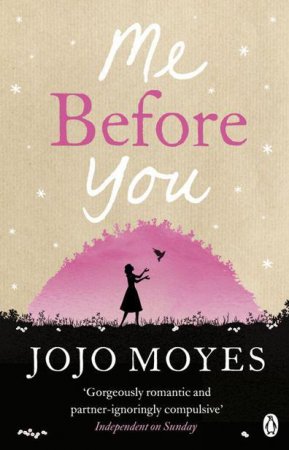 Me Before You
Me Before You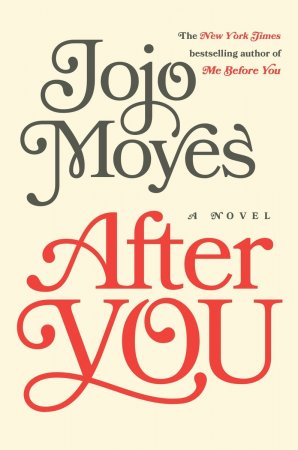 After You
After You The Last Letter From Your Lover
The Last Letter From Your Lover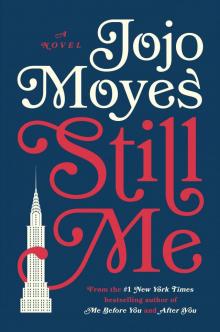 Still Me
Still Me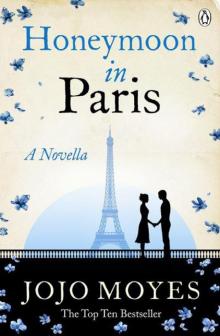 Honeymoon in Paris
Honeymoon in Paris Night Music
Night Music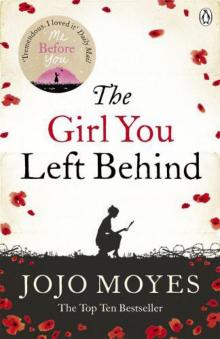 The Girl You Left Behind
The Girl You Left Behind Windfallen
Windfallen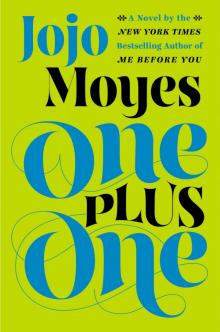 One Plus One
One Plus One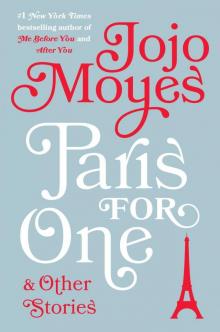 Paris for One and Other Stories
Paris for One and Other Stories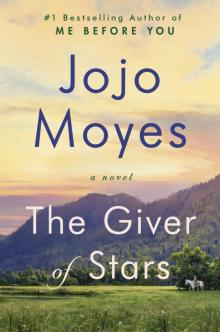 The Giver of Stars
The Giver of Stars The Ship of Brides
The Ship of Brides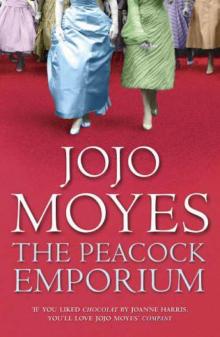 The Peacock Emporium
The Peacock Emporium Silver Bay
Silver Bay The Horse Dancer
The Horse Dancer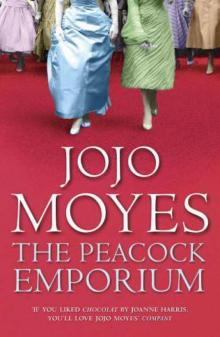 Peacock Emporium
Peacock Emporium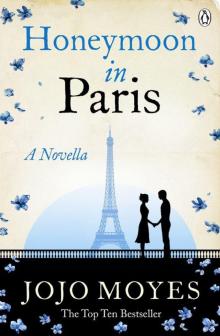 Honeymoon in Paris: A Novella
Honeymoon in Paris: A Novella Ship of Brides
Ship of Brides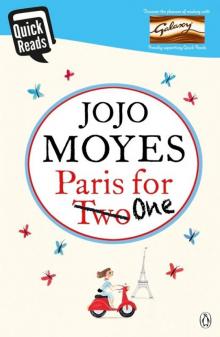 Paris For One (Quick Reads)
Paris For One (Quick Reads)